人教版小学六年级英语下册复习资料(非常有用)
人教版小学六年级英语下学期总复习资料

小学英语知识点归纳、总结资料一般疑问句一般疑问句是: 1.以be动词 (am,is,are,)开头2.以情态动词Can或助动词Do,Does,Did 开头回答方法:做肯定或否定回答。
1.肯定回答 Yes,主语 + 提问词.2.否定回答 No,主语+提问词+not.主语是人名时的答语:看性别,男的用he ,女的用she ,其他的用it ,复数就用they。
1. Is she......? Yes, she is. No,she isn,t. .Is he......? Yes, he is. No,he isn,t.Is she strict?她严厉吗?-Yes,she is.是的。
Is he young?他年轻吗?-Yes ,he is.是的。
Is he Wu Yifan?他是吴一凡吗?- Yes,he is.是的。
Is she in the study?她在书房吗?-No, she isn’t.不,她没在。
Is she in the kitchen?她在厨房吗?Yes,he is.是的。
Is she in the living room?她在客厅吗?No,she isn’t.不,她没在。
Is he drinking water?他正在喝水吗?No,he isn’t.不,他没有。
2.Is it....? Yes, it is. No, it isn’t.Is it in your desk? 它在你书桌里吗?-Yes.it is.是的。
Is it cold in Moscow? 莫斯科冷吗?-Yes.it is.是的。
Is this your uncle? 这是你叔叔吗?-Yes,it is.-是的。
Is this your pencil? 这是你的铅笔吗?Yes,it is.-是的。
3.Is there...? Yes,there is. No,there isn’tIs there a river in the park?在这个公园里有一条河吗?Y es,there is.是的,有。
人教版小学六年级下册英语课文复习资料全册
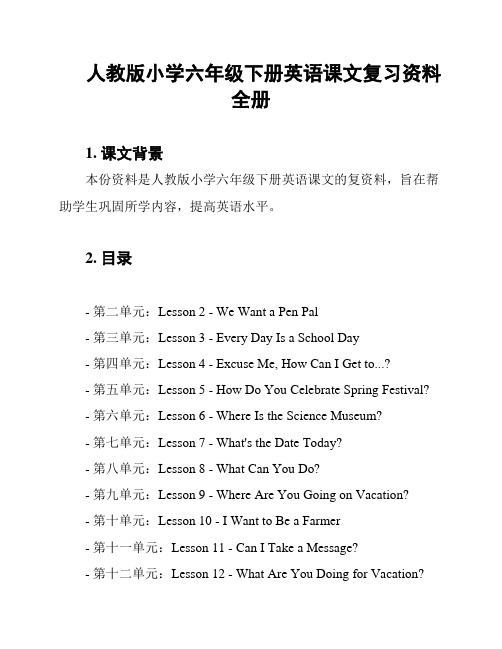
人教版小学六年级下册英语课文复习资料全册1. 课文背景本份资料是人教版小学六年级下册英语课文的复资料,旨在帮助学生巩固所学内容,提高英语水平。
2. 目录- 第二单元:Lesson 2 - We Want a Pen Pal- 第三单元:Lesson 3 - Every Day Is a School Day- 第四单元:Lesson 4 - Excuse Me, How Can I Get to...?- 第五单元:Lesson 5 - How Do You Celebrate Spring Festival?- 第六单元:Lesson 6 - Where Is the Science Museum?- 第七单元:Lesson 7 - What's the Date Today?- 第八单元:Lesson 8 - What Can You Do?- 第九单元:Lesson 9 - Where Are You Going on Vacation?- 第十单元:Lesson 10 - I Want to Be a Farmer- 第十一单元:Lesson 11 - Can I Take a Message?- 第十二单元:Lesson 12 - What Are You Doing for Vacation?- 第十三单元:Lesson 13 - Give Me Some Advice, Please- 第十四单元:Lesson 14 - What Do You Want to Be in the Future?- 第十五单元:Lesson 15 - Travelling Around the World3. 使用说明学生可根据自己的研究进度选择相应的单元进行复。
每个单元包含一个课文的标题,通过阅读课文并进行练,学生可以巩固词汇、句型和语法等方面的知识。
4. 复方法为了有效地进行复,建议学生采取以下策略:- 阅读课文:仔细阅读每个课文,理解内容和语法结构。
新人教版英语六年级下册复习资料

新人教版英语六年级下册复习资料六年级的同学就要进行小学毕业考试了,那么孩子们应该怎样进行复习呢?英语又该怎样复习呢?下面是由店铺整理的新人教版英语六年级下册复习资料,一起来看看吧。
新人教版英语六年级下册复习资料第一部分1.-- How do you go to school? 你怎么去上学?-- I go to school on foot. 我步行去上学。
2. My home is near. 我家很近。
3. We can go to the bus stop on foot. Then we go to the park by bus.我们可以先步行到车站,然后坐车到公园。
4. See you then. See you at 2 o’clock. 那再见了,我们两点见。
5.-Can I go on foot? 我可以步行去吗- Sure,It’s not far.当然可以,并不远的.6. ---Excuse me. Where is the library? 打扰一下,请问一下图书馆在哪里?--- It’s near the post office在邮局附近。
7. ---Is it far from here? 离这里远吗?---No, it’s not far. 不远的。
8. ---How can I go to the hospital? 我怎么能到医院?---You can go by the No.301 bus. Ger off at the cinema.你可以坐301路车过去。
在电影院下车,Then walk straight for three minutes. The hospital is on the left.然后笔直走3分钟就到了。
医院在左边。
9. ---How can I go to the mesume? 我怎么能到博物馆?--Go straight for five minutes. Then turn left. 笔直走5分钟,然后向左拐.10. ---Where is the post offfice? 邮局在哪里?--- It’s east of the cinema. 在电影院的东边。
人教版六年级英语下册全册要点总结复习资料
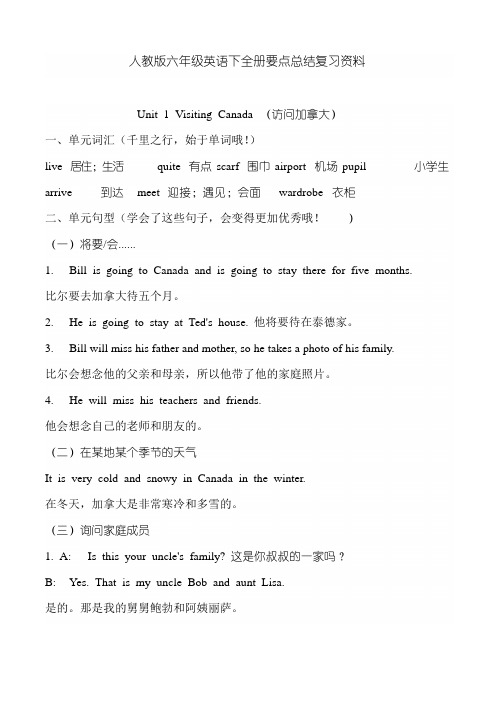
人教版六年级英语下全册要点总结复习资料Unit1Visiting Canada(访问加拿大)一、单元词汇(千里之行,始于单词哦!)live居住;生活quite有点scarf围巾airport机场pupil小学生arrive到达meet迎接;遇见;会面wardrobe衣柜二、单元句型(学会了这些句子,会变得更加优秀哦!)(一)将要/会......1.Bill is going to Canada and is going to stay there for five months.比尔要去加拿大待五个月。
2.He is going to stay at Ted's house.他将要待在泰德家。
3.Bill will miss his father and mother,so he takes a photo of his family.比尔会想念他的父亲和母亲,所以他带了他的家庭照片。
4.He will miss his teachers and friends.他会想念自己的老师和朋友的。
(二)在某地某个季节的天气It is very cold and snowy in Canada in the winter.在冬天,加拿大是非常寒冷和多雪的。
(三)询问家庭成员1.A:Is this your uncle's family?这是你叔叔的一家吗?B:Yes.That is my uncle Bob and aunt Lisa.是的。
那是我的舅舅鲍勃和阿姨丽萨。
2.A:Who is that girl?那个女孩是谁?B:That's Jenny,my cousin.那是珍妮,我的表妹。
3.A:Who are the people in this photo?这张照片里的人是谁?B:They are my grandparents.他们是我的祖父母。
(四)职业1.My uncle is a famous artist.我的叔叔是一位著名的艺术家。
六年级下册人教版英语总复习资料

六年级下册人教版英语总复习资料期末将至,那么六年级的孩子应该怎样应付人教版六年级下册英语期末的考试呢?复习要用哪些资料?下面是由的六年级下册人教版英语总复习资料,希望对您有用。
一、词汇tall ----- taller 高的----更高的short ----- shorter矮的/短的----更矮的/更短的long ------ longer 长的----更长的strong------ stronger 强壮的----更强壮的old ------ older 老的/旧的----更老的/更旧的young------ younger年轻的-----更年轻的small------ smaller小的----更小的big-----bigger 大的-----更大的thin-----thinner 瘦的-----更瘦的fat-----fatter 胖的------更胖的happy-----happier 开心的-----更开心的 heavy-----heavier 重的------更重的funny-----funnier 滑稽的------更滑稽的 wear穿 size号码 tail尾巴shark鲨鱼 deep深的 feet脚seal海豹 killer whale虎鲸sperm whale抹香鲸 squid 鱿鱼than 比 cm厘米 meter 米think想 little小的lobster 龙虾 ton吨二、重点句型⑴问年龄、身高、体重等How old are you? -- I’m _______ (years old).How tall are you? ----- I’m ______ cm tall.How heavy are you? ------- I’m ______ kg .⑵问物品的情况① How large is your room? 你的房间有多大。
It’s __________ m2 (square meters.) 有_______ 平方米。
六年级英语下学期(PEP人教版)全册单元知识点复习资料
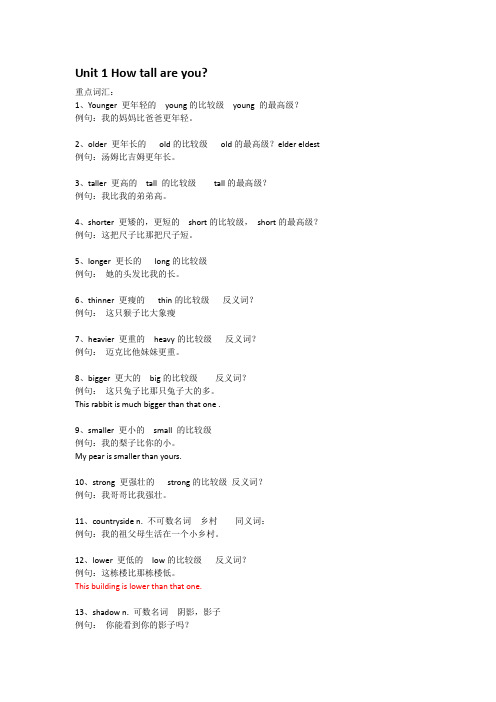
Unit 1 How tall are you?重点词汇:1、Younger 更年轻的young的比较级young 的最高级?例句:我的妈妈比爸爸更年轻。
2、older 更年长的old的比较级old的最高级?elder eldest 例句:汤姆比吉姆更年长。
3、taller 更高的tall 的比较级tall的最高级?例句:我比我的弟弟高。
4、shorter 更矮的,更短的short的比较级,short的最高级?例句:这把尺子比那把尺子短。
5、longer 更长的long的比较级例句:她的头发比我的长。
6、thinner 更瘦的thin的比较级反义词?例句:这只猴子比大象瘦7、heavier 更重的heavy的比较级反义词?例句:迈克比他妹妹更重。
8、bigger 更大的big的比较级反义词?例句:这只兔子比那只兔子大的多。
This rabbit is much bigger than that one .9、smaller 更小的small 的比较级例句:我的梨子比你的小。
My pear is smaller than yours.10、strong 更强壮的strong的比较级反义词?例句:我哥哥比我强壮。
11、countryside n. 不可数名词乡村同义词:例句:我的祖父母生活在一个小乡村。
12、lower 更低的low的比较级反义词?例句:这栋楼比那栋楼低。
This building is lower than that one.13、shadow n. 可数名词阴影,影子例句:你能看到你的影子吗?14、smarter 更聪明的smart的比较级例句:你变得越来越聪明了。
You are getting smarter and smarter.15、become v. 开始变得,变成例句:这个女孩想成为一名演员。
This girl wants to become an actress.重点短语:How tall 多高how heavy 多重how old 多大what size 多大号In this hall 在这个厅里both of 两个都over there 在那边have a look 看一看Go down 下降重点句型:①形容词的最高级:最高级通常用于3人或者3人以上的人或事物之间的比较。
六年级英语人教版下册知识汇总
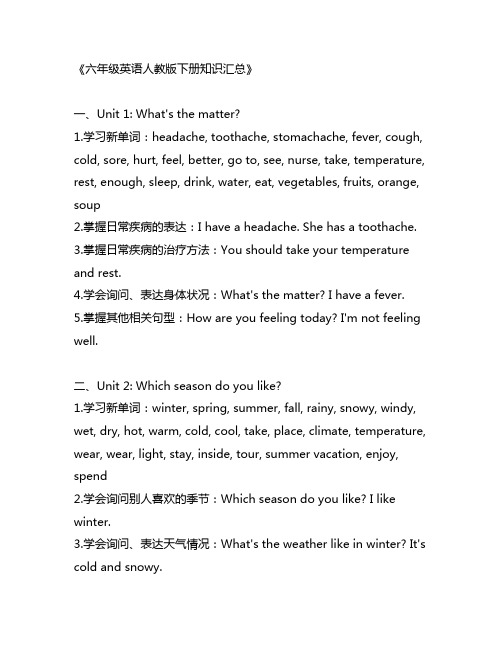
《六年级英语人教版下册知识汇总》一、Unit 1: What's the matter?1.学习新单词:headache, toothache, stomachache, fever, cough, cold, sore, hurt, feel, better, go to, see, nurse, take, temperature, rest, enough, sleep, drink, water, eat, vegetables, fruits, orange, soup2.掌握日常疾病的表达:I have a headache. She has a toothache.3.掌握日常疾病的治疗方法:You should take your temperature and rest.4.学会询问、表达身体状况:What's the matter? I have a fever.5.掌握其他相关句型:How are you feeling today? I'm not feeling well.二、Unit 2: Which season do you like?1.学习新单词:winter, spring, summer, fall, rainy, snowy, windy, wet, dry, hot, warm, cold, cool, take, place, climate, temperature, wear, wear, light, stay, inside, tour, summer vacation, enjoy, spend2.学会询问别人喜欢的季节:Which season do you like? I like winter.3.学会询问、表达天气情况:What's the weather like in winter? It's cold and snowy.4.学会描述喜欢的季节特征:I like summer because it's warm and sunny.5.学会描述自己在某个季节所做的活动:I stay inside and read in winter.三、Unit 3: What are you doing for vacation?1.学习新单词:museum, camping, hiking, zoo, beach, climb, mountain, forest, river, lake, trip, tour, visit, site, decide, activity, prepare, ready, camping, pack, tent,pass, sleeping bag, flashlight, mirror, toothbrush, toothpaste, camera2.学会询问别人在假期做什么:What are you doing for vacation? I'm camping.3.学会描述自己假期的计划:I'm climbing mountains and visiting the zoo.4.学会建议朋友假期活动:You should go hiking and visit the museum.5.掌握相关活动的动词表达:We're visiting a zoo and camping near a river.四、Unit 4: How do you get to school?1.学习新单词:bike, helicopter, skate, walk, bus, subway, train, car, taxi, boat, ship, ferry, ride, fast, foot, wear, seat, belt, important, drive, carefully, happily2.学会询问别人通常怎么上学:How do you get to school? I go to school by bike.3.学会描述自己怎么上学:I walk to school every day.4.学会询问别人怎么去某个地方:How do you get to the zoo? I go by subway.5.掌握相关交通工具的动词表达:I ride a ferry to get to the island五、Unit 5: How much is it?1.学习新单词:shopping, mall, bookstore, drugstore, toy store, shoe store, music store, price, store, sell, money, pay, spend, buy, cheap, expensive, sale, discount, Dollar, Cent, Euro, Pound, Yen, Yuan2.学会询问价格:How much is the T-shirt? It's $ 10.3.学会描述购物体验:I went to the bookstore and bought a book.4.学会询问和表达购物时的价格:The shoes are expensive. I spend $50 on theputer.5.掌握货币表达方式:How much is the dress? It's 100 yuan.六、Unit 6: I'm watching TV.1.学习新单词:play, TV,puter, video, game, chat, with, friend, alone, sometimes, air, outside, talk, on the phone, make, model, ship, airplane, kite, bird, rocket, fly, away2.学会询问别人在做什么:What are you doing? I'm playingputergames.3.学会描述自己正在做的事情:I'm watching TV and chatting with my friend.4.学会表达自己的喜好:I like playing video games and talking on the phone.5.学会表达某些特殊活动:I'm flying a kite in the park.七、Unit 7: What does she look like?1.学习新单词:young, old, have, long, short, curly, straight, blonde, hair, eyes, wear, glasses, big, small, pretty, handsome, tall, short, slim, heavy, dress, skirt, T-shirt, blouse, shirt2.学会询问看起来是什么样子:What does she look like? She is tall and slim.3.学会描述别人的外貌特征:She has long, curly hair and big eyes.4.学会询问和描述服装穿着:What is she wearing? She is wearinga skirt and a T-shirt.5.学会表达自己的外貌特征:I have short, straight hair and small eyes.八、Unit 8: How was your school trip?1.学习新单词:school trip, climb, mountain, wonder, student, teacher, guide, learn, lot, see, different, plant, animal, ground, sun, shine, sky, blue, tree, leaf, same, big, small, much, little2.学会询问和描述学校旅行的情况:How was your school trip? It was wonderful. We climbed a mountain and saw many different plants and animals.3.学会询问和表达在旅行中所见所闻:What did you see on the school trip? We saw a lot of birds and flowers.4.学会表达个人感受:It was a great experience. I learnt a lot during the school trip.5.掌握描述旅行中自然环境的单词和短语:There were many big trees and much sunshine during the school trip.九、Unit 9: When is Easter?1.学习新单词:month, year, holiday, Easter, Christmas, New Year's Day, Spring Festival, Halloween, Thanksgiving Day, Valentine's Day, Mother's Day, Father's Day, holiday, celebrate, on, in, when2.学会询问和表达节日时间:When is Christmas? It's on December 25th.3.学会介绍和讨论节日习俗:We celebrate Thanksgiving Day on the fourth Thursday of November.4.学会描述不同节日习俗:We give presents on Valentine's Day.5.学会对不同节日的预祝:Happy New Year! Happy Mother's Day!结语:以上是六年级英语人教版下册知识的汇总总结,通过对每个单元内容的梳理和归纳,可以更好地帮助学生系统地学习和掌握相关知识,在英语学习过程中取得更好的学习效果。
人教版六年级下册英语重点复习资料
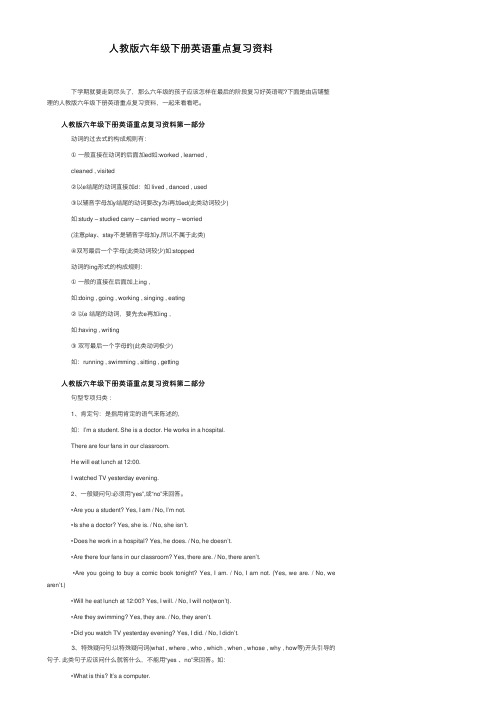
⼈教版六年级下册英语重点复习资料 下学期就要⾛到尽头了,那么六年级的孩⼦应该怎样在最后的阶段复习好英语呢?下⾯是由店铺整理的⼈教版六年级下册英语重点复习资料,⼀起来看看吧。
⼈教版六年级下册英语重点复习资料第⼀部分 动词的过去式的构成规则有: ①⼀般直接在动词的后⾯加ed如:worked , learned , cleaned , visited ②以e结尾的动词直接加d:如 lived , danced , used ③以辅⾳字母加y结尾的动词要改y为i再加ed(此类动词较少) 如:study – studied carry – carried worry – worried (注意play、stay不是辅⾳字母加y,所以不属于此类) ④双写最后⼀个字母(此类动词较少)如:stopped 动词的ing形式的构成规则: ①⼀般的直接在后⾯加上ing , 如:doing , going , working , singing , eating ②以e 结尾的动词,要先去e再加ing , 如:having , writing ③双写最后⼀个字母的(此类动词极少) 如:running , swimming , sitting , getting ⼈教版六年级下册英语重点复习资料第⼆部分 句型专项归类: 1、肯定句:是指⽤肯定的语⽓来陈述的, 如:I’m a student. She is a doctor. He works in a hospital. There are four fans in our classroom. He will eat lunch at 12:00. I watched TV yesterday evening. 2、⼀般疑问句:必须⽤“yes”,或“no”来回答。
•Are you a student? Yes, I am / No, I’m not. •Is she a doctor? Yes, she is. / No, she isn’t. •Does he work in a hospital? Yes, he does. / No, he doesn’t. •Are there four fans in our classroom? Yes, there are. / No, there aren’t. •Are you going to buy a comic book tonight? Yes, I am. / No, I am not. (Yes, we are. / No, we aren’t.) •Will he eat lunch at 12:00? Yes, I will. / No, I will not(won’t). •Are they swimming? Yes, they are. / No, they aren’t. •Did you watch TV yesterday evening? Yes, I did. / No, I didn’t. 3、特殊疑问句:以特殊疑问词(what , where , who , which , when , whose , why , how等)开头引导的句⼦. 此类句⼦应该问什么就答什么,不能⽤“yes 、no”来回答。
- 1、下载文档前请自行甄别文档内容的完整性,平台不提供额外的编辑、内容补充、找答案等附加服务。
- 2、"仅部分预览"的文档,不可在线预览部分如存在完整性等问题,可反馈申请退款(可完整预览的文档不适用该条件!)。
- 3、如文档侵犯您的权益,请联系客服反馈,我们会尽快为您处理(人工客服工作时间:9:00-18:30)。
PEP人教版小学六年级下册总结Unit 1 How Tall Are You?【词汇考点】tall—taller更高的? long—longer 更长的short—shorter更矮的? heavy—heavier更重的thin—thinner更瘦的?? strong—stronger 更强壮的? big—bigger更大的small—smaller更小的???old—older 年龄更大的? young—younger 更年轻的?【语法考点】时态:比较级在一般现在时中的运用一.形容词比较级和最高级的变形规则1.一般单音节词和少数以-er,-ow结尾的双音节词,比较级在后面加-er,最高级在后面加-est;(1)单音节词tall→taller→tallest 如:small→smaller→smallest short→shorter→shortest(2)双音节词如:clever→cleverer→cleverest narrow→narrower→narrowest2.以不发音e结尾的单音节词,比较在原级后加-r,最高级在原级后加-st;如:large→larger→largest nice→nicer→nicest able→abler→ablest3.在重读闭音节(即:辅音+元音+辅音)中,先双写末尾的辅音字母,比较级加-er,最高级加-est;如:big→bigger→biggest hot→hotter→hottest fat→fatter→fattest4.以“辅音字母+y”结尾的双音节词, 把y改为i,比较级加-er,最高级加-est;如:easy→easier→easiest heavy→heavier→heaviestbusy→busier→busiest happy→happier→happiest5.其他双音节词和多音节词,比较级在前面加more,最高级在前面加most;如:beautiful→more beautiful→most beautifult differentdifferent→more different→moseasily→more easily→most easily注意:(1)形容词最高级前通常必须用定冠词the,副词最高级前可不用.例句:The Sahara is the biggest desert in the world.(2)形容词most前面没有the,不表示最高级的含义,只表示"非常".It is a most important problem.=It is a very important problem.6.有少数形容词、副词的比较级和最高级是不规则的,必须熟记.如:good→better→best well→better→best bad→worse→worst ill→worse→worst old→older/elder→oldest/eldest many/much→more→most little→less→leastfarthestfar→further/farther→ furthest/二. 重点句型⑴问年龄,身高,体重等How old are you? How tall are you? How heavy are you?---- I’m _______ (years old). ------ I’m ______ cm tall. ------- I’m ______ kg .⑵问物品的情况:① How large is your room? 你的房间有多大?2 (square meters.) 有_______ 平方米。
It’s __________ m②How long is your bed? 你的床有多长?It’s _________cm long. 有______厘米长。
③How big are your feet? 你的脚有多长?I wear size ______. 我穿_______码的鞋。
⑶形容谁比谁更……am①… be is ( even/much ) …er than …aree.g. I am taller than you. 我比你高。
I am 4 cm taller than your brother. 我比你弟弟高4cm .I am taller and stronger than your brother.我比你的弟弟更高更壮。
Jack is even stronger than his father. Jack 甚至比他爸爸还壮。
Zhang Peng and John are much younger than Mr.Green.张鹏和John 比Mr. Green 要年轻多了。
注意:比较的两者必须是同类的。
有用的句型:1.Which monkey do you like? 你喜欢哪一只猴子?I like the yellow one. 我喜欢黄色的那只。
2.I think the little monkey is only 40 cm tall. 我想那只小猴只有40cm 高。
3.Its tail is about 38 cm long. 它的尾巴约有38cm.4.A sperm whale is ____________ than a killer whale in its length.Exercise For Unit 1一、写出下列各句中的形容词的对应词。
1.I don’t like the smaller dog. I like the _____________ one.2.Jack and John are twin brothers(孪生兄弟),but they are very different: Jack is tall and strong, butJohn is _________ and __________.3.My older brother is even y_______________ than you.4.Yesterday I was happy. But today I am much ___________ .二、根据首字母和句意填空。
1. W_______ elephant do you like ? I like the baby elephant.2. W________ is taller than you in your class. Chen Ming is.3. I t___________ you can go back home now.4. A sperm whale h________50 teeth. And i__________ tail is usually 8 meters long.5. A killer whale can j____________ out of water.三、根据实际情况回答问题:1. How old are you?_______________________________________________________________2. How tall are you ?_______________________________________________________________3. How heavy are you ?________________________________________________________________5.How heavy are you?_________________________________________________________________6.How many students are there in your class?__________________________________________________________________7.How much is your English book?____________________________________________________________________四、组词成句。
1、are, you, than, shorter, me._____________________________________________2、you’re, than, me, 4cm, taller._____________________________________________3、I’m, than, you, one, year, older._____________________________________________4、heavy, how, you, are? ______________________________________________5、I’m, than, bigger and stronger, you . ______________________________________________Unit 2 Last Weekend【词汇考点】stayed at home 呆在家里(stay -stayed 停留;待)watched TV 看电视(Watch - watched 看)打扫房间(clean-cleaned 打washed one’s clothes洗衣服(wash-washed 洗)clean one’s room扫)read a book 读书(read,cut,put 无变形)had a cold感冒(have/has---- had有,使,吃..)【语法考点】时态:一般过去时一.一般过去时的定义:一般过去时是表示过去经常或偶然发生的动作或存在的状态的时态.常与过去时间yesterday, this morning, just now, a moment ago, in May, last night / year / week, once upon a time, the other day, clause, in the past连用。
before …, when –如:I was there a moment ago. 刚才我在那儿。
What did you do yesterday? 昨天你干了什么?I met Lin Tao this morning. 今天上午我会到了林涛。
